Preppers already have experience in storing food, clothing, and other important essentials.
However, there are many other resources around the house that can also prove invaluable for survival – things that you can recycle, collect or repurpose into useful tools and bargaining chips. Take a look at our full list and see which you can start collecting today. As a bonus, you’ll notice that many of these items have excellent synergy with each other as you continue learning how to reuse everything around you!
Dryer Lint
When it comes to small, throwaway things, nothing is quite so humble as dryer lint, which is why many people throw it away as soon as they take it out of the dryer. However, that lint has an excellent use that we should all know about: It’s a perfect tinder filler when starting fires. Grab a bag or other container and start storing your dryer lint. It can compact very tightly, allowing you to collect it for years until you need the perfect tinder material.
Used Tires
Used tires are an excellent garden resource! The wheel itself can be buried or filled with soil to create an easy, weed-free planter. If you lack comfortable resting space, you can use tires to make a quick DIY outdoor seat. If you’re feeling creative, tire treads also make an excellent liner for pots, tables, and steps. When in doubt, you can also build a swing for the kids!
Plastic Grocery Bags
A single plastic grocery bag is flimsy and a little annoying – you want to do something with it, but you aren’t sure what and it wouldn’t last long for any serious task. A hundred plastic grocery bags, however, are an excellent start for insulation materials. It’s a cinch to stuff grocery bags in cracks, open spaces between studs, shed walls, and anywhere else where you need some extra warmth. You’ll quickly find out that these spots can hold a nearly endless number of scrunched-up grocery bags, which will trap tiny pockets of air and offer effective insulation. Just make sure to keep them away from fireplaces, furnaces, and other sources of heat!
Water or Milk Jugs
Wash these jugs out with a little bleach and use them for storage. They are particularly well suited for storing long-term foodstuffs and gardening resources. Beans, seeds, rice, grains – they are all perfect fits for these jugs without weighing too much. If you don’t like buying sealed water from the store for your personal storage, you can also boil water and refill these jugs with clean water for longer-term resources.
Glass Jars
There are many types of glass jars out there, and not all are worth saving. However, many sturdy jars (especially around mason jar size) can serve important purposes. Use them as makeshift lanterns for outdoor candles. Fill them with soil for a safe, tiny garden that’s excellent for nurturing starter plants. Fill them with awkward screws, larger spices or nuts, and other objects that just don’t fit anywhere else. And while you can bake muffins or brownies in glass jars, you should be wary about canning with used jars: Unless you can guarantee an airtight seal with a canning lid, the jars become havens for dangerous bacteria.
Wax Materials
We’re talking about anything waxy here: Beeswax, crayons, melted candles, and so on. In most cases, you can collect the leftovers, melt them down again, and recreate a candle (wick required) without having to buy a new one – another use for those mid-sized glass jars! You can also do the same with soap, but don’t combine the more caustic soap pieces with your potential candle pieces.
Cooking Grease
Cooking grease, including baking grease, is far more durable than many realize. This is why you should never pour grease down a drain or into garbage disposal since it will congeal there and clog your pipes. However, if you have a sealable container handy, you can strain out that grease through a cheesecloth or similar strainer (to remove impurities from cooking), and store it for reuse: Once cooled down, cooking grease lasts for a very, very long time, so it’s definitely worth saving.
The big exception here, if you don’t already know it, is cooking grease from cooking fish. Fish oil will become inseparable from the other grease used and…well, it will stink. Permanently. Throw away fish-based cooking grease.
This Timeless Collection of Forgotten Wisdom Will Help You Survive!
Spice and Pill Bottles
Obviously you can use these for your spices and homemade pills, but that’s only the beginning. These bottles are the perfect size for unique little storage kits where you can hold all the materials you need for a survival solution. Put in some fishing line, a few hooks and small weights, maybe a lure or two, and you have a fishing kit ready to go in an emergency. Put in some of that dryer lint and a few matches, and you have a fire kit safe from the rain. Those are just some of the many different kits you can create, which makes it easy to see why many people keep these bottles in their bug-out bags.
Used Shoes
It may not seem like old shows have much use after you are done wearing them, except as a dog chew toy. However, historically shoes have actually been one of the most valuable items in the average house: They are traditionally expensive, hard to make, and worn until they literally fall apart. Without shoes, even basic travel becomes far more difficult and dangerous, making them largely mandatory and in high demand.
That’s why the most thorough preppers set aside a bin or box for used and outgrown shoes: If economic systems collapse, they are one of the best items for bartering, and even old shoes still have a lot of personal value in them when you can’t get new shoes anymore.
Empty Lighters
When a lighter has emptied and no longer produces a stable flame, most people throw them away and get another without a second thought. But even empty lighters can prove surprisingly useful, especially if there’s no chance at getting any lighter fluid. The small sparks that the light produces can still light fires, especially when combined with a sensitive tinder-like lint – it’s a readymade flint sparker that you can keep in your pocket, or store in one of those spice bottles for a fire kit. Like shoes, you may even want to consider storing a collection for trade, just in case.
Old Motors and Small Engine
We’re not talking about vehicle-sized motors, which don’t really have much value outside of the car. But small motors, like the kind used for lawnmowers, actually have a lot of applications. Engines from something small like a mower are simpler (and don’t usually require complex fuel additives), highly portable, and amenable to…creative reconstruction. In the right conditions you can use them to power a generator, or to create a personal transport device, or to repair other devices that require an engine to function. Have an electric mower instead? Don’t worry! The best electric mower models have powerful batteries that can hold a charge for a long time, making them a valuable commodity if electricity becomes a rare resource.
Newspaper
Chances are good that you already have a list of things to do with newspaper, from using it to start fires and clean windows to cutting it up for mulch. But we’d like to suggest a more long-term use for a newspaper that will have you double-checking your stash: Weaving a basket. When the newspaper is rolled into strips, it becomes a surprisingly reliable weaving material that can create all types of baskets and holders. These are great for storage, disposable trash cans, or simply creating useful items to share or sell – and they aren’t quite as attractive to pests as cardboard.
Egg Cartons
If you haven’t tried this yet, save your next egg carton and use it as a starter kit for herbs or other plants. Simply fill each egg section with a bit of rich soil, plant your seeds, water lightly, and perch the carton by a window to watch the results. It’s the perfect way to start a number of small seeds at the same time. You can also use these cartons as fuel for the fire in a pinch.
Any Type of Binding
We mean rope, twisty-ties, wire, twine, string – anything that you can use for binding. These materials are invaluable for securing objects, building makeshift shelters, creating security perimeters, fixing broken equipment, building weapons, and much more. Never underestimate the usefulness of a simple piece of rope!
What Survival Secret We Lost To History
Tin Cans
Combine a tin can with some curled cardboard a bit of that leftover wax we mentioned above, and you can create your own little mini heater. Of course, tin cans have many other uses, from perimeter alarms to weapons, but we’re partial to the mini heater idea since it’s easy to create using scrap materials and offers a lot of value. Even if you don’t keep many tin cans around, at least try this project out so you know how to do it!
Bread Bags
Remember above, where we talked about how valuable commodity shoes can be when the worst happens? Those of you in rainy areas probably thought: Great, but unless those shoes are waterproof, they aren’t going to be very useful where I’m at. Enter the humble bread bag – an ordinary plastic bag, but the perfect size for wrapping up water-sensitive shoes before going out in the rain. This keeps your feet from getting wet (along with the potential health issues it brings) and helps protect vulnerable shoes.
Leftover Lumber
Lumber comes with an important caveat: Leftover pieces of lumber tend to be large and heavy. That means you may have trouble finding a place to store them, or problems taking them with you if you have to leave in a hurry. That’s fine! But if you do have space and security, keep those extra pieces of lumber around. They are obviously good for just about any construction project, support system, bulwark, or garden.
Pennies
After the precious metals like gold and silver (which can be difficult to recycle), copper is actually one of the more valuable metals today and offers even more practical value if manufacturing suddenly becomes difficult. Older pennies from before 1982 in particular are known for their high copper content. Start a collection jar for old pennies so you can stock up!
Chopsticks
Need a little extra kindling? Chopsticks are easy to collect and the ideal larger tinder material, perfect for constructing efficient fires. It’s also useful to have some smaller wood pieces around for minor supports and building or craft projects. If you don’t have room for large lumber, you can still collect chopsticks!
Safety Pins
A trusty jar of safety pins can help you in uncounted survival situations. You can connect blankets together to build a quick shelter or partition, close tears in clothing so that it can better protect you against the elements, and even use them to help close wounds when nothing else is available. The pins can also act as mini-tweezers for delicate work, crafting tools, and so much more.
However, make sure that you keep your safety pins in a well-sealed jar and a safe environment: Moisture may cause the pins to eventually rust and lose their efficacy.
Small Wheels
If you are in a hurry and short on space, it may be difficult to take a cart, wheelbarrow, or scooter with you. However, everyone has room enough for the small wheels that are the key parts of these devices. You can recycle wheels from older carts, toys, and other items you may have around the house. Keep these wheels in your bag along with a few compatible screws, and you will be able to create a cart or platform for transportation as long as you can find a few basic scrap materials.


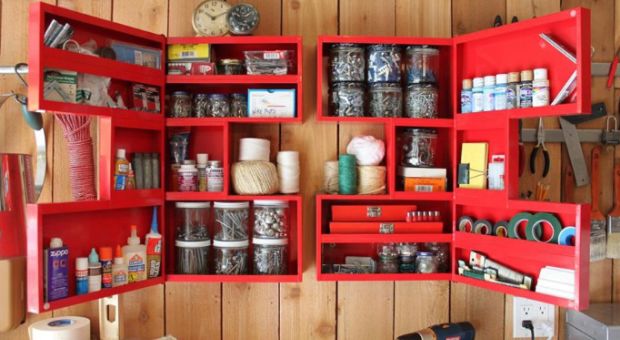
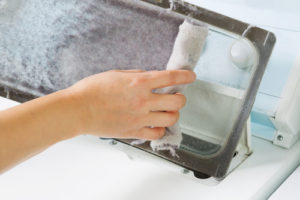

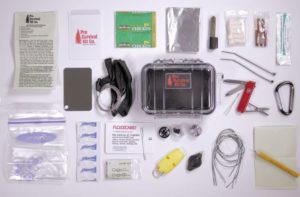

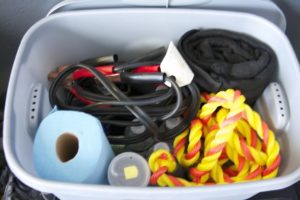

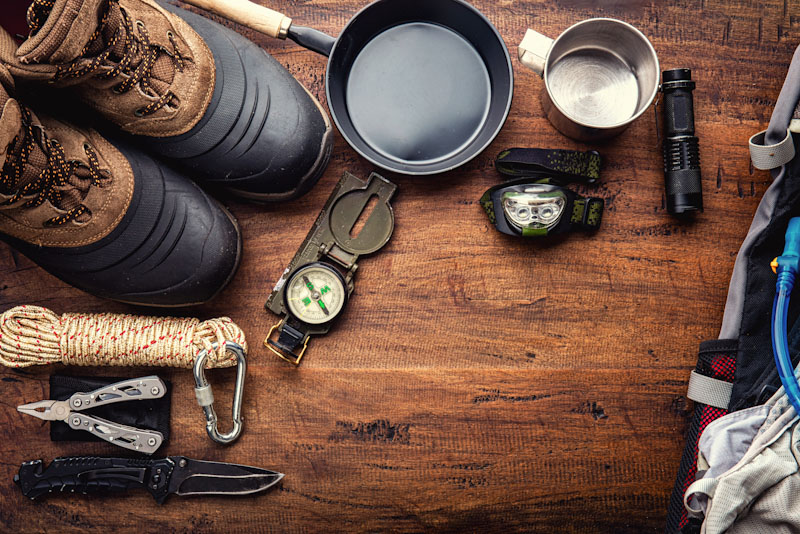
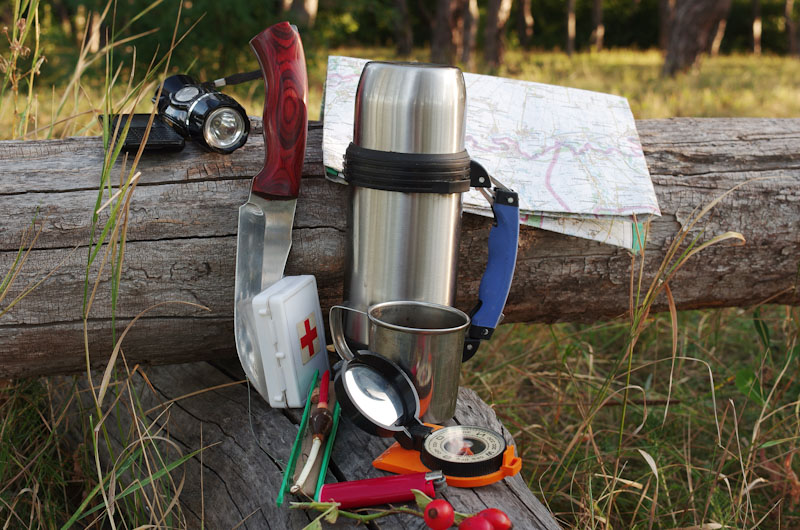
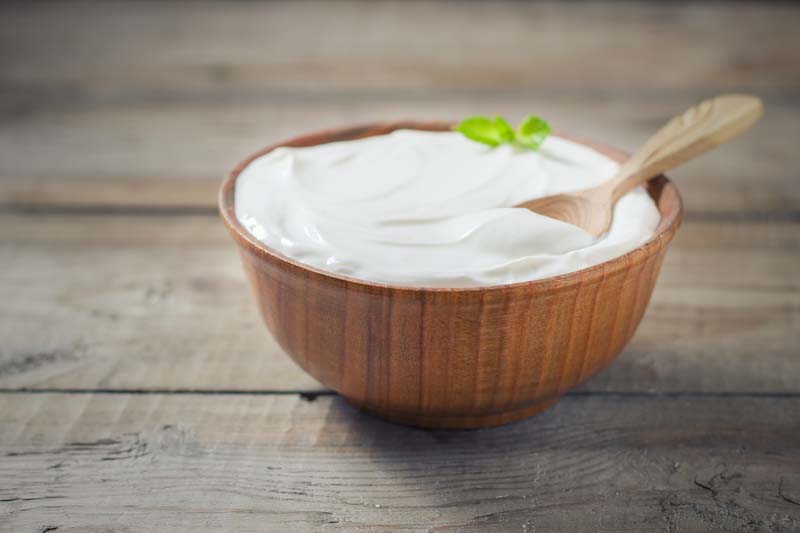
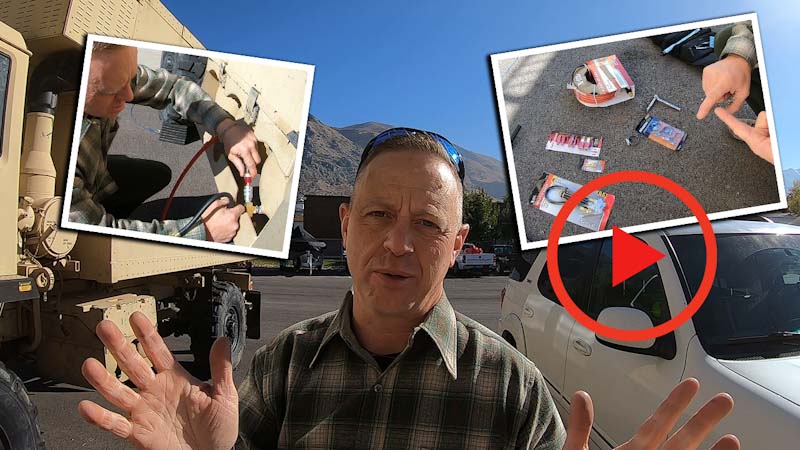

Tracy | September 30, 2018
|
You forgot another thing that newspaper is good for,newspaper fire logs.You make several layers of newspaper and roll it up into a log,soak it in water,then let it dry.BOOM,you have a newspaper fire log.
Arthur | September 30, 2018
|
In reference to electric motor, when one of the fans that cool the engine stripped its blades, I asked from the garage if I could keep the whole two fan housing. You see, both fan motors still work and one still has the blades on it. I plan to disassemble the fans from the housing and mount the good one in one of my heating ducts to circulate the warm air from my wood stove up stairs through out the house. I already have the solar panel and batteries to feed the motor,
Glenn Trombly | October 8, 2018
|
automobile cooling fans draw a lot of current. 20 + amps is not uncommon. just keep this in mind so you’re not surprised when the batteries don’t last long.
Tony Bell | October 3, 2021
|
Adding a variable resistor can help with that issue. Allows one to control the fan speed and thereby the amps usage.
Griffinaero | September 30, 2018
|
Even non-canning jars can be sealed using melted wax. Just pour about a half-inch on top of the food you’ve prepared for storage. The wax can be used over and over
griffinaero | September 30, 2018
|
Pennies are made of zinc now and aren’t worth much, but they’re useful as corrosion resistant washers when drilled. For serious rust proof washers nickels and even quarters are good. Quarters make good hose sealers when sandwitched between an old broken-off threaded end
Armin | September 30, 2018
|
@Griffinaero While using wax to seal even a non-canning jar is a really good idea and has been used successfully for many years what I find a more interesting solution is to seal a non-canning jar with a thin layer of alcohol. Drinking alcohol, not rubbing. After I fill the jar to about 3/4 of an inch from the top. And at that point whatever I’m filling the jar with is still steaming hot having just come out of the cooking pot. Before I screw the lid on I pour perhaps a quarter inch of booze over the entire top of whatever jam or compot I’m canning and the way I look at it is that the booze will most certainly kill ANY pathogens that may have snuck in there at the last moment. And the hot liquid gives off alcohol vapours which after I’ve sealed the jar will condense when the jar cools and provide a better seal than just the product alone. After it’s sealed there is NO way anything bad can grow in that environment when a thin layer of alcohol covers the jam or whatever. I’ve been doing it like this for some time now and have products that I’ve successfully stored like this for years without any problems whatsoever. And when you again open the jar for the first time and take out that first spoonful of jam it makes for a most interesting experience first thing in the morning. Quite the wake up call. LOL.
Mark | February 15, 2019
|
Love that! A great idea I’ve never seen anywhere else. And a little eye-opener in the morning bonus…heh heh.
Kevin | September 30, 2018
|
If one also learns how to process alcohol from wood, they can have usable fuel for those small engines long into the future in a total collapse situation. Used cooking oil, if changed fairly often, can be used in those same small engines, even if that oil is made from rendered animal fats.
TheObtuse | October 1, 2018
|
The heavier fats are best used in Diesel engines, they can destroy 2 cycle engines pretty quickly.
Armin | October 1, 2018
|
@TheObtuse I’ve also heard that. A few years back and it might still be going on, I don’t know. There was a big movement on to pick up all the used cooking oil from places like MacDonalds and KFC. And then process it so you could run a diesel engine on it. Apparently a diesel is quite content to run on a number of different fuels that you might not think of as fuels including things like peanut oil. And in a true grid down situation petrol and diesel fuels might just be in short supply so if we have a working diesel engine we have to improvise and adapt so that we can still use the tools that are left.
TheObtuse | October 3, 2018
|
The original Diesel engine, unveiled at the world’s fair in the 1880s was designed to run on organic short chain oils, like peanut or canola oils. It is the long chain fatty acids and waxes found in animal proteins and fats which are troublesome. The fuel delivery system must be kept above the solidification temp for the oils / waxes to be a useful fuel. The seals are also most profoundly affected but these as well.
The Triple B's. | October 4, 2018
|
Older diesels can also run on JP8, Kerosene, new or filtered transmission fluid, light weight motor oil, vegetable oil, used and filtered cooking oil, mineral oils from electrical conductors and a mixture of all. In the winter you are limited due to the solidification temperature (like Obtuse mentioned) but in the summer you can use all of the above. ALSO you cannot use any of the above in a gasoline engine (also like Obtuse mentioned). Talk about a truly multi-fuel motor, diesels are extremely versatile.
mr.e man | October 20, 2018
|
Diesels will run on used oil year round in moderate winter climates. all the mentioned fuels will work but can be hard starting except for cooking oil, it can solidify and has water in it. I run a diesel truck with duel tanks and use one for starting and then change over to the other tank for driving. plan on changing fuel filters more often.
Ranger Rick | September 30, 2018
|
Never use milk jugs for any liquid you will use or for food. You can not clean a milk container well enough, Years ago we tested them and everyone of the containers grew some nasty stuff..
Ranger
Bill in Idaho | February 15, 2019
|
Ranger Rick, You hit the nail on the head ! ALL Milk Jugs (Plastic, not glass) are made from LDPE (Low Density Poly-Ethelene) – They Will NOT Last over 3 Months as a reliable container. Exposed to the sun, make that 6 Weeks. Save yourself the trouble.
Trish | February 15, 2019
|
Milk jugs can be used to store water for flushing toilets in a temporary emergency. Actual water jugs (like from any store) can be used to refill with water and store food.
Kevan | October 3, 2021
|
PENNIES ARE NOT COPPER … ONLY THE SKIN IS…1982 N BEFORE ARE COPPER…
Lighters are still useful to light gas stoves…
Charles Brown | October 1, 2018
|
Get your eggs in the pressed paper cartons, fill the spaces with your dryer lint, top off with either canning wzx or leftover candles. You can cut them apart and have a dozen fire starters. Don’t use the styrofoam cartons, though, they will just melt and not give yoou the fire starters. You can also put a wick in each space in the carton, fill with wax, and you have a dozen small candles.
Chuck | October 1, 2018
|
Put the bread bags over your feet then put your shoes on. If you put them over your shoes (as you suggest) they won’t last 100 steps befor the bottoms are torn and shredded.
Clergylady | October 1, 2018
|
Cans are handy items. I cooked and drank from first a soup can then a can that once held corn. It was a prized possession for a time alone living in the hills. I made tea and cooked food in it. I boiled, cooled, then drank water from a can. In the shop I collect nuts, bolts, nails, tacks et in a can till I get them sorted. One sits by my gas stove with a long lighter resting in it. I made a solar heater with bags of washed and dried vegetable cans. Like the more popular heaters being made from pop cans. My aunt roofed a chicken house with cans cut along the seam and flattened. Who hasn’t made a noisy tail for a car for a wedding? A Noisy trap covering a path is good and easy. Pull tab can lids are easy to tie in fruit trees or grape vines to scare off birds. We used to bake bread in 1 lb coffee cans. You can strain grease into a can or melt wax to make candles in a can. I’ve punched holes in a can with a punch can opener or a nail to make a pretty candle holder or with a wire handle its a lantern. I’ve melted bits of soap in a can to remold it. Mom melted wax in a vegetable can to pour onto jelley to seal it. I have a pot with a spout. Grandma saved tomatoes for seed in cans where they could ferment to be easily cleaned for saving. I’ve mixed up paint in a can that made it easy to hold while painting cabinets or furniture. I use a can as a single days rabbit food scoop. I’d bet you can add many more uses to that list. I have older large coffee cans packed as caches in the mountain above me.
B Lashbrook | February 16, 2019
|
Clergylady,…WOW!
Thank you for sharing.
A lot of great ideas.
STEVEN A WHALLEY | February 18, 2019
|
WOW! I LOVE YOU! WHEN DOES YOUR BOOK COME OUT??? SERIOUSLY, GOOD SOLID INFO AND IDEAS. ELABORATING ON JUST A CAN FOR SO MANY USES, AWESOME! HAVEN’T SEEN THAT MUCH CREATIVITY SINCE FOXFIRE SERIES OF BOOKS!
Dutch Kinderknecht | October 2, 2018
|
Re: empty lighters
If you use electronic lighters, the piezo electric spark virtually NEVER runs out, and never misfires. Stick the lighter in some dryer lint, and you can almost guarantee you will have fire.
Scott | October 2, 2018
|
You can also use the egg cartons with the wax add in some wood chips or lint (not as good now with most clothing being synthetic) to make firestarters. Good idea learned from being a Scout Leader
Dave | October 9, 2018
|
I’ve grown cotton as an ornamental. It was very easy to grow even in poor, sandy soil. Do you think a couple of blooming plants would be better than a load of lint?
Nick | November 11, 2018
|
It’s the super-dried aspect of lint from a clothes drier that makes it so useful for firestarting Dave. Any plant fibre should work fine for firestarting if it’s dry enough.
Dave | November 11, 2018
|
Hadn’t thought of that aspect. Thanks.
Michelle | November 25, 2018
|
Also with how fine the fibers are from the lint which makes it easier for it to ignite
STEVEN A WHALLEY | February 18, 2019
|
I USE THE COMPRESSED EGG CARTONS ALSO FOR FIRE STARTERS AT HOME. WHEN YOU USE A PAPER TOWEL FOR SOMETHING NOT REAL YUCKY, STICK IT ASIDE TO DRY,TEAR THEM INTO BALLS THAT FIGHT THE EGG HOLDERS AND ADD YOUR LEFT OVER OLD GREASE. ONE MATCH, ONE FIRE!
Molly B | October 5, 2019
|
Being a long-time prepper, I have used 1-gallon plastic milk jugs for years to store water in the freezer. The water a few years old tastes and looks just like the water straight out of the faucet. The bonus is in the event of electrical outages the frozen gallon jugs will keep the food frozen or very cold for days longer than it would keep without the water jugs. Grab a jug and throw it in your ice chest as you are leaving for the grocery store on a hot day. Your food will stay cold until you get home. Your freezer will run more efficiently if it is full, and if you need the freezer space just throw the jugs and water out or use it to water plants, lawns, or even wash the car. I have never had a jug break during the freezing process. However, I usually set them in a pan or bucket for several hours or overnight just in case. Half-gallon juice jugs work equally as well as milk jugs.
anonymous | October 2, 2018
|
Shredded up used tires also make a pretty decent firestarter.
I carry re-used plastic baggies in my pocket nearly all the time. If you need a container or want to protect your phone from precipitation, place in baggie, seal and rest easy. If you need to pick up something nasty for disposal, turn bag inside out, grab item from opposite side of bag (like a glove, turn over, and throw out. Easy peasy.
Those feedback ideas are very good – thank you for contributing those too !
Dave | October 9, 2018
|
Great article.
mr.e man | October 20, 2018
|
some other items to repurpose.
1. used zip-lock bags, great storage and won’t conduct electricity for use in item 3.
2. used batteries, I collect used batteries at work for recycling and test them. about half and still good. free batteries.
3. metal tins. great little containers for kits and may be usable as little faraday shields for C.B. radios when item stored is insulated from electrical currents.
4. Tic Tac packs. remove the top and it will hold 3 AA or 4 AAA batteries for nice little battery back-up pack
Anne | November 1, 2018
|
love the idea of the tic tac container for batteries
Craig R | October 27, 2018
|
Along with dryer lint and pill bottles. Never throw out cotton packing from vitamin and supplement bottles. You can stuff a massive amount of it into a single ziplock back for tossing into a bug out bag.
Lisa | October 4, 2019
|
I learned to save the bottle cotton from a very frugal lady. Why buy cotton balls, this is free.
Sean | October 30, 2018
|
I have been turning 1gal white milk jugs w/screw-on lids into marker bouys for crab traps. Turned upside down and drew a large “R” (for ‘Recreational’) on 2 sides. Exceeds FL requirements (float must be min 6″, R must be min 4″, highly visible). Cost nothing except some Sharpie ink. I can use them for trotlines, etc.
Trish | November 18, 2018
|
I saw a video on YouTube where they took the plastic shopping bags and made sleeping mats for homeless people. It takes a while to create one, but it would be water resistant/proof and keep the sleeping bag off the ground. It would also be good for creating an “area rug” for a primitive shelter to sit on or keep your shoes and gear off the ground. I suppose it could also be used as a bit of insulation for a shelter as well.
Kathleen Hanford | December 13, 2018
|
I make sleeping mats for the homeless. As I don’t have enough room (I live in a single wide trailer) to weave one, I cut the bags in quarters and crochet them. It only takes the ability to make a chain and then single crochet stitch until it is big enough. No PHD required! One under you and one over your sleeping bag will keep you snug.
ivuzw mv3po | January 7, 2019
|
Another use for zip-lock bags is to zip them over your outside mirors of your cqr to keep ice-free during wet freezing temps. Just pull off when getting ready to go some where.
Trish | January 7, 2019
|
WOW! I never would have thought of this brilliant idea for a zip lock bag!! HUGE Thank You for this idea!!
Ellen M Whiting | February 15, 2019
|
One-gallon milk jugs make great mini-greenhouses for tomato & pepper seedlings. Cut off the bottom 1″ of the jug with a sharp knife and leave the cap off. Place it over the seedling and scoop up the soil around the outside to keep it from blowing away in the wind. If the plant starts growing up out of the top and it’s not quite warm enough yet, you can lift the jug up a few inches and scoop more soil around it. Mine typically last 2 or 3 seasons.
Kevin S | February 15, 2019
|
Another use for old tires is footwear. My father told me about finding Viet Cong troops in Viet Nam wearing sandals made from tire tread pieces. He said they also used tire inner tubes for sealing / preserving weapons and ammo from moisture.
Shane | February 15, 2019
|
Steel-belted sandals. Would probably outlast the owner!
Bradley Lashbrook | February 18, 2019
|
Good point Kevin S
In 1990, I got a pair of sandals made while stationed in the Philippines. Tire soles with leather footbed. The vendor traced around my foot, told me to come back in three days. $10.00 and I still have them.
Ed Schrade | October 5, 2019
|
A larger inner tube can be cut to make a scope lens cover.
red | February 16, 2019
|
Good article, and I’ve done much if it. Dryer lint! Works great, but fishworms love it, so to the compost it goes, unless we need it. But, we use a solar dryer (AKA clothesline). The dryer is needed for dark duds or you’ll be picking lint off clothes forever.
Used tire: No, not here. Here, we dig down at least 3 feet to get the caliche out or you can spend all summer watering and still lose the garden. Used tires should go to people who can reply them and sell them. Most of this is done in Mexico, so it keeps the primos at work. No work, no manhood, folks say.
Milk and water jugs: Water, yes. Better, vinegar jugs. Food grade, meant to last for years, and can be resealed if you take care not to melt them. Anything else, fill with sand or clay (liquid) and use as building blocks, but cover well with adobe or another clay.
It’s hard to find glass jars we can use for canning, but plastic bottles are much better to store things like screws. Recycle glass. If you have an oven for baking ceramics, it can be used to recycle glass into small windowpanes with wire in them. Or, hippy wind chimes and so on. Bottles were used to build homes in places where there’s little wood to be had, but plenty of clay. Pack clay aroud the bottles with the bottom open so the sun shines in.
Wax! You got it. Wax is very recyclable. You can make bullet molds with it if you’re good at such things. Leave a small hole in the bottom of the mold to let out the wax as you pour in the lead, AKA lost wax method.
Cooking oil and grease make emergency lamps and fuel. Once oil has been used a time or two, it darkens from hydrogen infused in it. It should not be used too long (nor should you eat margarine, which uses hydrogen). It will seal leather and canvas, but beware of animals looking for a snack.
Spice and pill bottles: !
Used shoes: Replace the sole and heel. We wear them till they’re falling apart to go hiking and so on.
Lighters: Often the reason a lighter will not work is dirt stuck in it that kills the spark. When one won’t, give a sharp puff or two of breath to see if that works. If it’s out of gas, sorry, but that’s a great idea to save them for an inexpensive flint and steel.
SkiptheBS | February 17, 2019
|
Soft drink bottles make superb mini-greenhouse/plant starters. Cut the bottom couple of inches off and perforate for drainage. Replace the tops and lids. On a hot day, take the lid off to keep plants from suffocating.
Bleach bottles are great for storing water.
Innertubes are incredibly useful for gaskets, bushings if you glue several layers together, even jar lid gaskets for old Ball Ideals or French jars.
Leo | February 17, 2019
|
Another use for plastic grocery bags, make rope. Cut off the handles and bottom making a plastic loop that can then be crocheted and braided. I have a rope strong enough to tow a car and another that I us to help in taking down pine trees.
red | February 18, 2019
|
Do you use thrift stores? Most would love to have the bags. By helping them and others on a regular basis, so they get to know you, workers will tell you, hey, can you use a … We put it aside if you want it. Often this is nothing much, but at times it’s good things, very useful things. All because I donated a mess of bags. Here, plastic gets eaten by the sun. It never lasts long unless buried. Even tires will degrade fast unless protected (armorall! 🙂 Everything we can, we recycle because the recyclers know us and will tell us if they have something we might like. It’s all part of the Law of Korema, the sharing in brotherhood in Native America. Americans once understood that by instinct, them liberalism destroyed us. Niio.
Ellen Whiting | February 18, 2019
|
I use Styrofoam egg cartons to start seeds. Cut off the top and use it for a tray. To make drainage holes in the cups, heat up a nail over a candle flame and poke it through. Protect your fingers with a rag, because the nail will get HOT.
Grammyprepper | August 20, 2019
|
I only save the dryer lint from my cotton towels and sheets. Clothing (unless 100% cotton) lint contains ‘crap’ that doesn’t necessarily burn as well and off-gasses stuff you don’t necessarily want to inhale. I second comments regarding reusing milk jugs. Use them for nonpotable water or other uses but not to store drinking water or food. Juice and soda bottles are less permeable and therefore easier to clean/sterilize.
I remember as a kid, we ALL wore breadbags over our shoes in our rain rubbers as well as over our socks in our snow boots! I save all my bacon grease, but I don’t leave it out on the stove like grandma did, keep mine in the fridge. DH complains about me saving glass jars and plastic containers but is always asking if I have something he can use to store things like nails and screws LOL!
Old clothing…some things like tshirts make good cleaning cloths. Old jeans can be used to repair other jeans.
Some things just shouldn’t be saved. There is a fine line between saving to repurpose and ‘hoarding’. If it doesn’t have another purpose, get rid of it!
Elaine | October 4, 2019
|
Grammy, you are right about the cotton and the polyester in the dryer lint. BUT! I would save both, but keep them separate! Use the cotton for when you would need to be around it or have it inside. But I would also save the polyester crap, for total emergency ONLY! That way, you would have it JUST IN CASE! I’m trying to buy all cotton (ORGANIC, no glyphosate crap) everything I can. Sheets, towels, clothes, blankets. Also, I have started buying VINTAGE cotton sheets off Ebay! The old ones from way before they were using glyphoshit on everything! So even though it is not organic, if you get the cotton ones, you don’t get the poison crap. For those of you who don’t know! The single crop in the world that has the most glyphosate used on it, is COTTON! Even more than on corn and soy. So I no longer buy cotton UNLESS it is organic (or old vintage on Ebay)!
earl garver | September 1, 2019
|
note about fuel & small 4 cycle engines , they will run on alcohol , that can be made from just about plant source. if your still (registered with ATF of course) is not made from copper or stainless DO NOT DRINK it. your engines will run just fine if you have your proff high enough & increase jet size 25 % + or-.
Jefferson NWENGLAND | November 14, 2019
|
WOW !!
I don’t think I’ve seen a better thread !!
So many Brilliant ideas !!
THANKS EVERYONE !!
Hope mine are worthy ?
Plastic bags for cavity wall insulation.
I keep a couple of plastic bags and credit cards in my EDC.
Use a bag for a emergency CPR mask, just make a hole and Presto, protection from cross infections or blood.
Use superglue around large wounds and cover with the bag.
Cover any amputation
Credit Card for Bullet wounds .
Not forgetting a bag for a simple rain hat or a larger one for a poncho.
Either will do to carry water.
Fill with leaves/moss for a pillow/blanket.
Bill | July 14, 2021
|
Good thread. The tire sandals from VN we called Ho Chi Minh sandals. Incredibly durable. You”ll never wear them out. Just change the ties on top when they rot off. I’m an old RVN disabled vet and use an oxygen concentrator at night. The medical supplier sends cases of sterile water for it so my throat doesn’t dry out. When the water is used, the bottles in which it came are very sturday and have graduate makings on the wide. I save them for emergency measuring devices and storage of potable liquids. There has been a spate of home building in my area. Rafters, joists, eaves and the like have the ends trimmed to fit and the stubs thrown in a dumpster. I bought a cheapo garbage can with a lid fom Wal-Mart and collected it full with those small pieces of cured lumber.. These small pieces of bone dry pine make excellent kindling and will burn long enough to dry out wet bidder chunks of firewood. The lid seals tightly so rain doesn’t get in. My father the cabinetmaker always used baby food, jelly, and similar jars in which to store small nails, screws, brads and the like. I still have a lot in my barn. I never discard a bolt, nut or the like I keep them in big bins or an old canister set in the barn. I almost never have to buy a fastener. I can almost always fine something the right size for nearly any project. Cotton balls smeared with a bit of waseline (petroleum jelly) make superb fire starters. I got a case of BIC propane lighters, inexpensive bought that way, and throw a fresh one in every car, in the shop, or wherever I can conceive of possibly needing to build a fire. They keep for nearly forever, and as the above noted, even when they’re dry, the sparkers work just dandy. I bought a stack of 5-gallon plastic buckets with lids from Lowe’s. I mjeep them in the basement, filled with flour, sugar, cornmeal, rice, any bulk material of the sort. The lids are airtight and they keep the vermin from getting to the foodstuffs.
anonymous | July 15, 2021
|
More than one trucker use (in their truck) extra large styrofoam coffee cups for emergency poop collectors, when you can’t get to a bathroom in time, or when it would be immodest to go trekking outdoors; and lacking that, they use plastic bags (with no holes in them). Wide opening plastic juice bottles (with lids) are very strong and secure. They can catch fluids, even cough material, saving tissues for other uses. In a BugOut hide location having the ability to collect excrement, avoid odors, and contain germs is important.
Lisa | November 16, 2021
|
I save all jars, even peanut butter jars. I use them to store dried herbs, dried beans, and sun dried tomatoes. That way I am not using up my canning jars, which are becoming harder and harder to find.
I save all kinds of bottles and jugs for water storage and for garden use. Many bottles can be used to protect newly planted seedlings, as was mentioned above. Also, milk jugs can be saved and cut up into strips to use for garden plant labels. If using bottles and jugs for water storage, make sure you recycle it and put in fresh water every six months. I use/ recycle mine to water plants in my greenhouse. Especially after it has sat all winter.
My fiancé thinks I’m crazy for saving so much stuff, but he appreciated the saved water when we were out of electricity for 9 days because of the derecho storm we had. I sat the jugs of water out in the sun to warm and we used them to take showers with.
I also save the plastic containers meat comes in. I wash them very well and use them in my greenhouse to set the plants in, that way when I water, the water stays in the meat container and continues to water the plants. I save all plastic containers to plant seeds in.
So many uses for so many things that most throw away. Great article!
deadwaters | November 16, 2021
|
NEVER use milk jugs to store water.! They are designed to deteriorate with time so to not take up landfill space. In spite of knowing this, I’ve tried it and sure enough, ,about a year later they started leaking even though they were in a dark room and constant temperature.
red | November 17, 2021
|
Like soda bottles, they good for making concrete blocks. But, living in Arizona, within months in the sun, all that’s left are scraps.
fred | November 16, 2021
|
You cannot use empty plastic milk jugs to store water. No matter how many times you clean it, don’t store water in such plastic jugs.